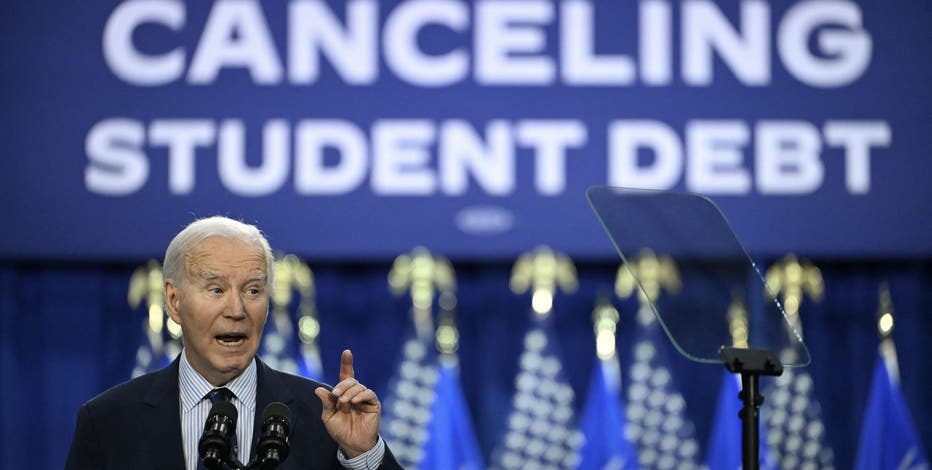
US President Joe Biden speaks about student loan debt relief at Madison Area Technical College in Madison, Wisconsin, April 8, 2024. (Photo by ANDREW CABALLERO-REYNOLDS/AFP via Getty Images)
null - Student loan borrowers who face steep medical bills, child care costs and other types of financial hardship could see their student loan debt erased under a new path to loan forgiveness from the Biden administration.
The administration announced the proposed rule Friday. It’s Biden’s third attempt to cancel student loans for millions of Americans, but legal challenges from Republican states have so far stopped his plans from going through. His first plan was rejected by the Supreme Court last year, and his second plan has been temporarily halted by a federal judge in Missouri.
RELATED: Biden administration has canceled student loans for over 1 million public workers
It’s unclear if Biden can get the new path finalized before he leaves office in January. The new plan is also likely to face lawsuits from conservatives who say student loan forgiveness is unconstitutional.
Who would qualify for financial hardship loan forgiveness?
The new rule would allow the Education Department to proactively cancel loans for borrowers if the agency determines they have an 80% chance of being in default on their loans within two years. Others could apply for a review to determine if they meet the criteria for cancelation.
It's meant to help borrowers who are unlikely to ever be able to repay their loans. The Education Department estimates about 8 million Americans would qualify for cancelation.
"For far too long, our broken student loan system has made it too hard for borrowers experiencing heartbreaking and financially devastating hardships to access relief, and it’s not right," said Education Secretary Miguel Cardona.
RELATED: States with the highest student loan payments: Study
Those who could be eligible include people with unexpected medical bills, high child care costs, heavy costs related to caring for relatives with chronic illnesses, and those struggling financially in the wake of natural disasters, the Education Department said.
Under the proposal, the department could use a range of factors to judge whether someone is likely to fall into default on their loans. It includes household income, age, whether they receive public benefits, and their overall debt — not just from student loans.
It also allows consideration of "any other indicators of hardship identified by the Secretary." A loan is usually considered in default if no payment has been made in about nine months.
With about 1 million borrowers in default every year, Cardona said the new rule would prevent his agency from trying to collect money it's unlikely to recoup.
"Servicing and collecting on defaulted loans is not free, it costs taxpayer dollars," Cardona said in a call with reporters. "And there’s a point when the cost of trying to collect on a defaulted loan just is not worth it."
Why do Republicans oppose student loan relief?
According to an AP-NORC poll released in June, only 39% of American adults believe it’s important for the federal government to forgive student loans. Less than a third of the people surveyed – about 30% – approve of how Biden is handling student loan debt.
Virginia Foxx, R-N.C., chair of the House Education and the Workforce Committee, called Biden’s latest move it a "sham plan" designed to curry voters ahead of the presidential election.
"The latest blatant attempt to bribe voters is the hallmark of a desperate administration that’s squandered the chance to make meaningful, lasting reform when it comes to college costs," Foxx said in a statement.
What’s next?
The proposal will enter a 30-day public comment period before it could become official. The administration said it plans to finalize the rule in 2025. It faces an uncertain future arriving less than two weeks before the Nov. 5 presidential election.
Vice President Kamala Harris, the Democratic nominee, has not detailed her plans for student debt cancelation if she wins the presidency. Republican nominee Donald Trump has called Biden's cancelation proposals unfair and illegal.
